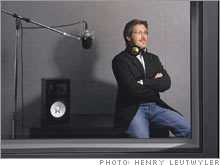|
Audible cranks it up
The digital audiobook company has ambitions that go way beyond putting novels online.
NEW YORK (Business 2.0) - Entrepreneur Donald Katz wants to do more than just make digital audiobooks. He wants to free the written word from Gutenberg's prison. Liberating words from print
Since the printing press was invented hundreds of years ago, the world has exploded with an ever-growing amount of text -- and now, we seem to have less time to read than ever. Katz's insight: Why don't we listen to words, instead of reading them?
Last fall, Katz stood at a podium in a conference hall outside Los Angeles and told a gathering of podcasters that they are in the vanguard of a major cultural transformation, one he saw coming 11 years ago when he founded his company, Audible (Research). Words as a marketable commodity, said Katz, are being liberated from mere printed text and are finally free to speak with the music of the human voice, as they did for millennia before Gutenberg. "The world of words consumed in a day, just on a paid basis, is unbelievably large -- it's hundreds of billions of dollars, if you take all the different disaggregated media formats," Katz tells the crowd, adding the sort of kicker that makes venture capitalists stand up and sniff the air: "Dwarfing, frankly, video and music by a large degree." Most consumers, of course, are far too busy to keep up with this vast outpouring of words. So Audible offers recorded versions for downloading and listening to on portable players. And now, after struggling to survive for a decade, the company is finally starting to catch fire. The spoken word on demand
Audible turned in its first profitable quarter in 2003, and more than doubled its number of new subscriptions (to 237,000) and its annual revenues (to an estimated $63 million) in 2005. In fact, for a few glorious days last fall, Audible's download of Thomas Friedman's book The World is Flat was the number one album on iTunes, outselling music my pop stars like Ashlee Simpson. With a vast archive of more than 90,000 hours of books, magazines, newspapers, interviews, and speeches, Katz's company has discovered a potentially enormous new market for what might be called "spoken word on demand." This remarkable double life of words -- existing as both inert smudges on a page and fleeting sounds -- is mirrored by the double life that Katz himself has led. Before founding Audible, he was one of the top writers of literary nonfiction in America, publishing books and magazine pieces on a wide variety of subjects. In late 1993, a $400,000 advance sent him researching the nascent "information superhighway," and Katz became so excited by the possibilities of distributing audiobooks over computers that he ditched the book idea and decided instead to start Audible, which he launched in 1995. For a while it seemed that Katz would join the parade of naifs who chucked great careers to chase dotcom dreams in vain. Despite impressive technology -- Audible invented the first Internet-ready audio player, now enshrined at the Smithsonian Institution -- the company was left for dead after the tech bubble's collapse. The road ahead
Today, thanks largely to the iPod explosion and Katz's tenacious refusal to give up, Audible is the leading contender to inherit the estimated $900 million market in audiobooks as it migrates to the Web, and perhaps grows many times larger. Audible faces immense challenges -- it lost money in 2005 because of heavy investments in new markets, and Goliaths like Microsoft (Research) and Amazon (Research) are now eyeing the spoken-word market. All of which makes the Audible story precisely the kind Katz would have loved to write, complete with its big ideas about how an audacious 54-year-old writer turned businessman hopes to spearhead a literary revolution by reviving the ancient art of oral storytelling using modern technology. But Katz himself is the story now. And as the Internet makes it easy and cheap for the masses to consume the oceans of words now washing across the mediasphere, the stakes could be huge. "There's no in-between," says Paul Hawken, the consultant and noted entrepreneur who co-founded Smith & Hawken. "Either Audible will be wallpaper or it will be a billion-dollar-plus company." _________________________________________________________________________________ To experience the digital-audio revolution yourself, listen to writer Paul Keegan read this story aloud here. Still prefer the written word? Read the full story as published in Business 2.0 here.
Click here to send a letter to the editor. |
|

